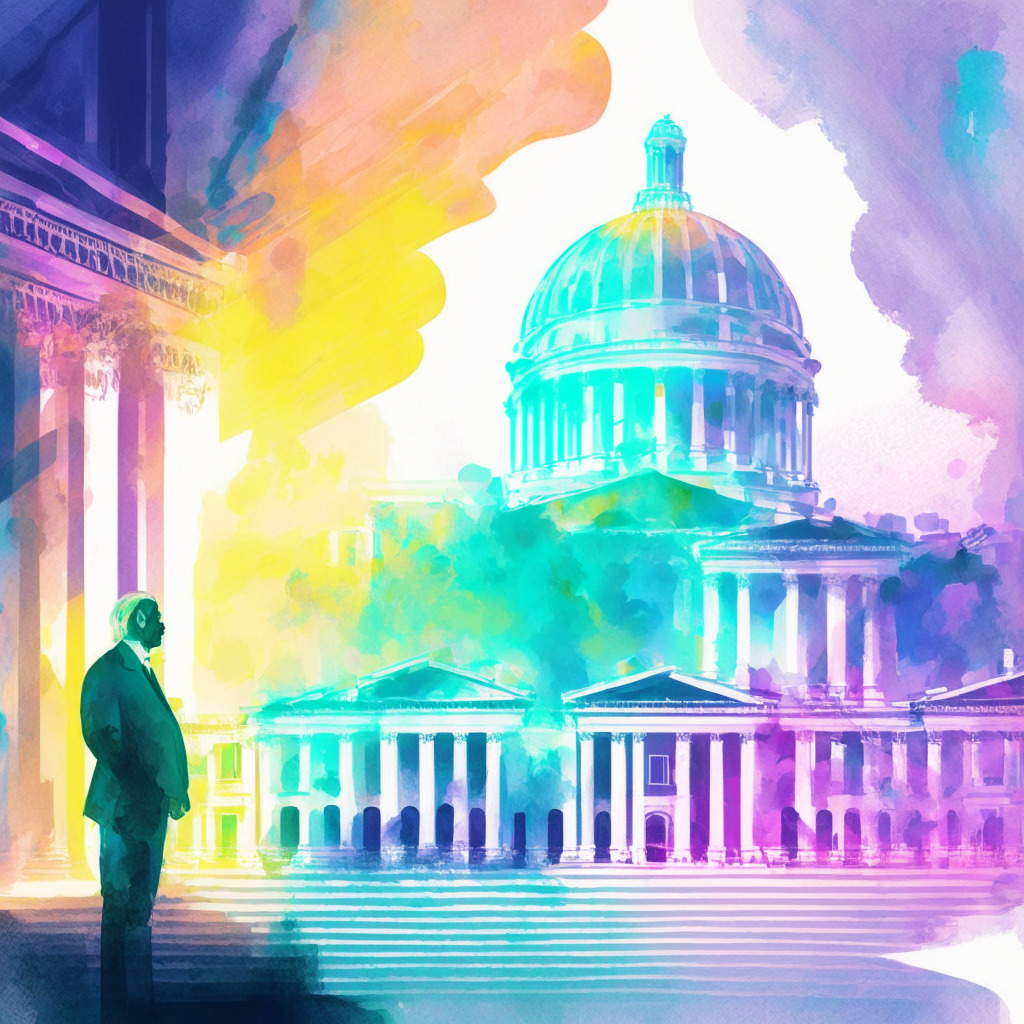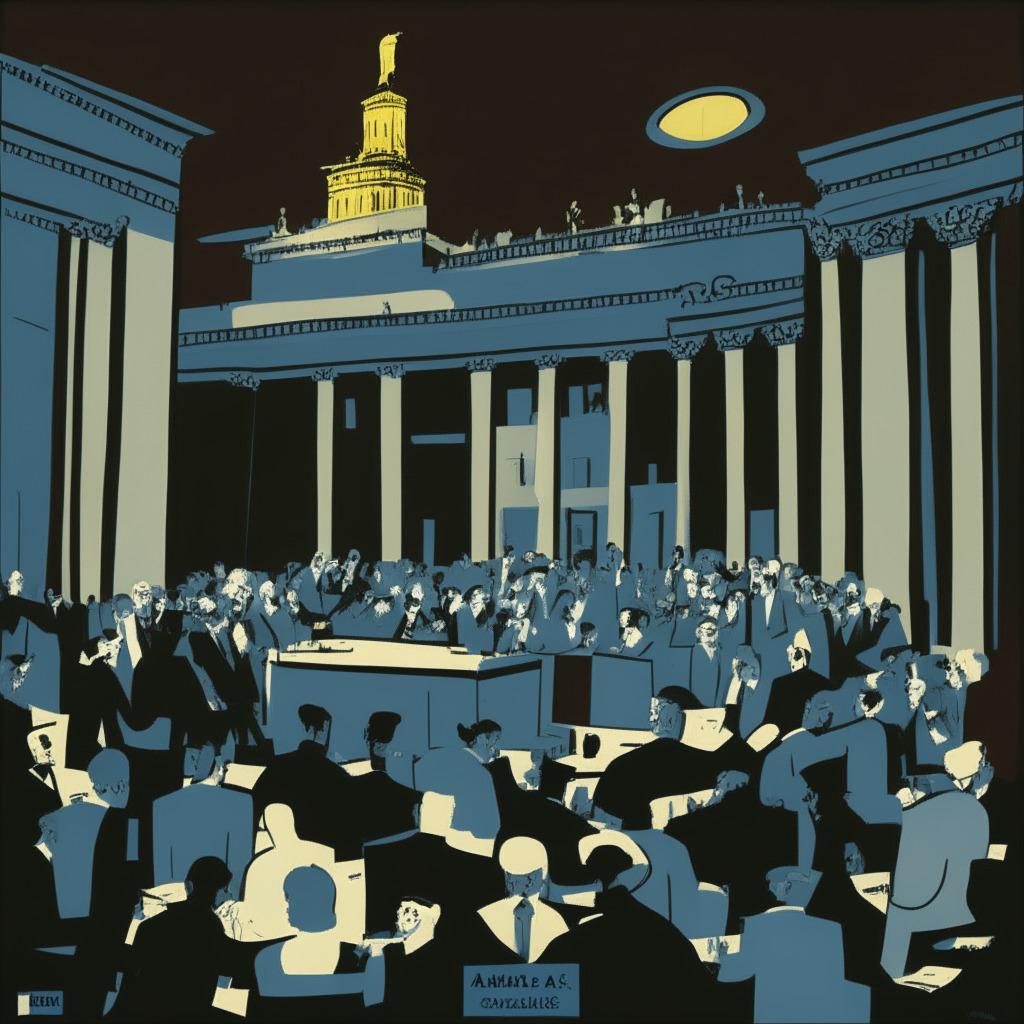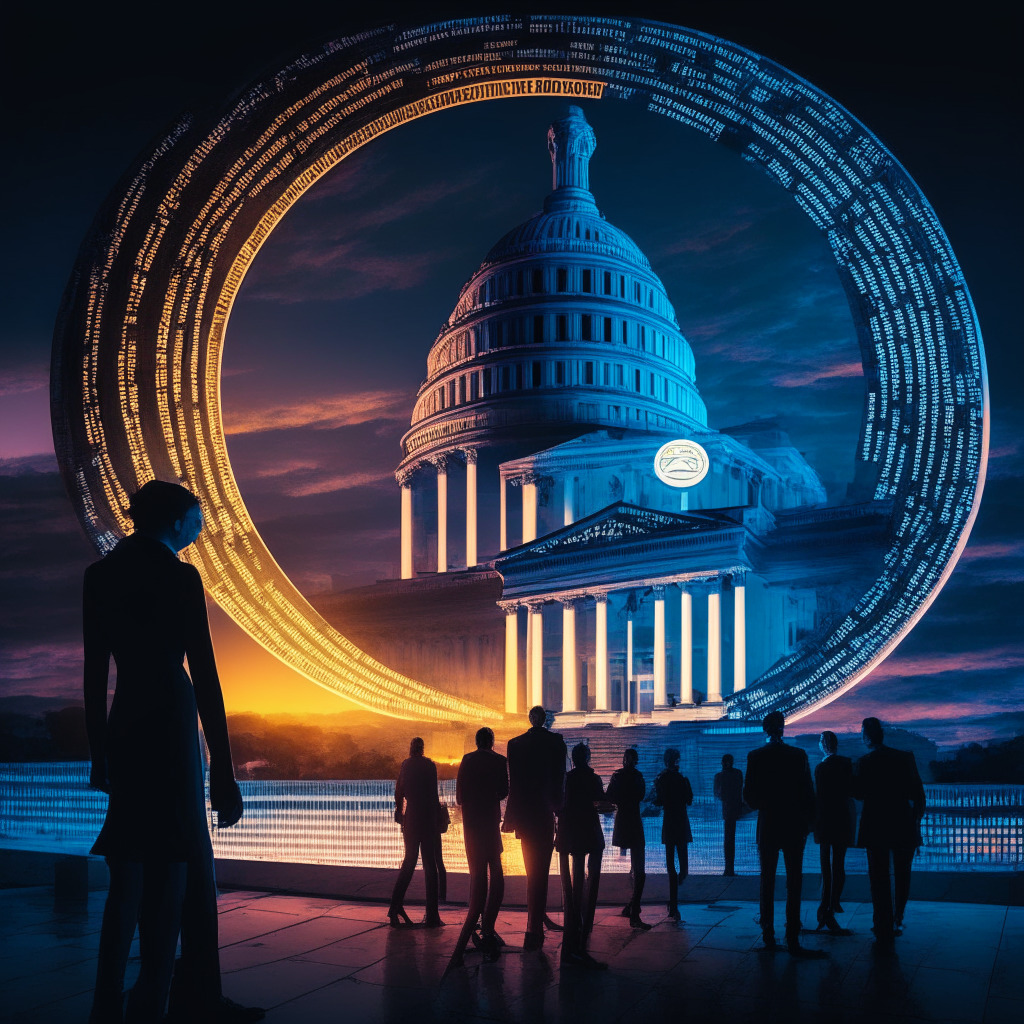The US faces a potential catastrophic default as President Joe Biden and Republican Kevin McCarthy urgently negotiate the debt ceiling. House Speaker McCarthy expresses optimism, with significant progress made during Wednesday’s talks. However, unresolved issues persist, causing tension in financial markets, including the crypto market. A deal failure by June 1st could result in severe consequences.
Search Results for: Joe Biden
Debt Ceiling Talks: Imminent Bitcoin Crash or Safe Haven During Turmoil?
President Joe Biden and Republican Kevin McCarthy will restart debt ceiling deal talks which may have ripple effects on the crypto market. As the financial market’s outcome remains uncertain, Bitcoin could either face turbulence or benefit as a “safe bet” during instability, drawing attention from crypto enthusiasts.
Debt Ceiling Talks Impact on Crypto: Crisis or Opportunity? Pros, Cons, and Conflicts
US President Joe Biden and Kevin McCarthy are restarting debt ceiling deal talks, while crypto traders express dismay over Biden’s lack of support for cryptocurrencies. The crypto community speculates that the deal’s outcome could benefit Bitcoin as relief may trigger a price jump, or uncertainty may turn it into a safe haven investment.
DAME Tax Debate: Balancing Crypto Mining, Environmental Impact, and Industry Growth
The proposed Digital Asset Mining Energy (DAME) excise tax in President Joe Biden’s budget aims to reduce greenhouse gas emissions and electricity costs by taxing 30% of electricity used by US cryptocurrency miners. Critics argue it could drive miners to countries with looser environmental regulations, potentially increasing emissions. The tax’s impact on renewable energy production and the crypto industry’s growth remains uncertain.
RFK Jr’s Pro-Crypto Presidential Run: Redefining America’s Financial Future and Political Landscape
Robert F. Kennedy Jr., running as an independent candidate in the upcoming U.S. Presidential Race, is adopting a pro-cryptocurrency stance. Aiming to make America a global hub for cryptocurrency, particularly Bitcoin, Kennedy proposes backing the USD with hard currencies, including Bitcoin. This move could fundamentally transform America’s position in the global crypto landscape and the fate of Bitcoin.
Navigating Uncharted Crypto Waters: The Impact of New House Leadership on Digital Asset Regulation
“A staunch crypto advocate, Representative Patrick McHenry, has provisionally stepped into the role of US House Speaker. McHenry has shown appreciation for the significance of American innovation and advocated for stablecoin regulation. These transitions bring opportunities and challenges for digital currencies and their regulation.”
Navigating Bitcoin Investments Amid U.S. Government Shutdown Fears: Strategies and Risks
Bitcoin’s rise towards $28,000 was linked to U.S. debt limit uncertainty. Despite skirting an immediate shutdown, risks of recession persist due to factors like inflation and surging oil prices. Bitcoin investors are bracing themselves for potential volatility as the debt ceiling decision nears, with strategic trading moves critical in this climate of uncertainty.
Government Shutdown Dodged: Possible Fallout for Cryptocurrency Regulation
“The future of cryptocurrency regulation was at risk with the potential for a government shutdown. This stalemate could have hindered several key crypto-focused bills, including the Financial Innovation and Technology for the 21st Century Act, the Blockchain Regulatory Certainty Act, among others, shaping crypto’s future.”
Bitcoin and Bureaucracy: Can a US Government Shutdown Ignite a Cryptocurrency Bull Run?
Marcel Pechman investigates the impact a potential U.S. government shutdown could have on Bitcoin, suggesting that an imbalance in wealth, rising consumer fear over escalating prices, and the possibility of inflation exceeding income growth could impose downward pressure on the cryptocurrency. Despite this, the shutdown could also spark a Bitcoin rally.
Shaping Elections 2024: How Cryptocurrency Could Swing the Political Pendulum
“Crypto guru, Brian Armstrong, predicts that the exploding interest in crypto will turn it into a defining issue in the 2024 elections. As 56 million Americans already operate with digital currency, its potential implications are engaging presidential candidates. However, the quest for clear crypto regulation still looms, with opportunities for legislative clarity potentially arising from the Securities and Exchange Commission.”
Navigating the US Crypto Regulatory Hurdles: Will Clarity Emerge or Companies Relocate?
The United States’ unclear crypto regulations are driving companies to seek more crypto-friendly countries. Tennessee Senator, Bill Hagerty, supports comprehensive cryptocurrency legislation in the US, replacing the current ‘regulation by enforcement’. He also highlights risks in the unrestricted adoption of Central Bank Digital Currencies (CBDCs).
FTX Saga: A Look into Big Finance, Politics, and Blockchain Intersection
“The indictment against FTX’s founder, Sam Bankman-Fried, for alleged violation of campaign finance laws and connections to a multibillion-dollar fraud gains momentum as key figures, including Ryan Salame, plead guilty. This saga highlights the intersection of finance, politics, and blockchain, shedding light on the potential misuse of this potent mix and prompting questions regarding customer safeguarding and innovation enhancement.”
Navigating the Blockchain Future: The Impact of Federal Leadership Changes on Crypto Regulation
“The leadership at institutions like the Federal Reserve significantly influence policy changes, specifically cryptocurrency and blockchain regulation. While the US Federal Reserve reportedly has no plans for a digital dollar, the recent changes in leadership may significantly impact future policy. As cryptocurrencies and blockchain technology reshape financial systems, the balance between innovation and regulation remains a focus.”
Crypto Regulation: Candidates’ Stances and Upcoming Election Implications
“Crypto regulation has become a significant issue in U.S. presidential campaigning. Candidates’ positions vary widely, from skepticism to enthusiastic adoption, yet the subject of digital assets regulation was absent from the recent Republican debate. This highlights the increasing importance of cryptocurrencies in our socio-political landscape, and suggests a need for informed legislation.”
Crypto Mining in the Energy Spotlight: DEC’s Mission to Reframe the Narrative
The newly launched Digital Energy Council (DEC) plans to highlight the positive role of crypto miners in the energy sector. Backed by technology’s flexibility, miners either provide energy during demand or buy excess energy, reducing waste. Despite facing regulatory scrutiny and proposed taxes, the DEC aims to dispel misconceptions around energy use and advocate for crypto miner’s interests, working towards greater recognition of digital asset mining.
Crypto Miners Unite: The Digital Energy Council Paves Way Amid Regulatory Tumult
The Digital Energy Council, an alliance of crypto miners, is seeking to influence U.S. policy for friendlier laws on sustainable energy development and grid resilience. However, their goals clash with the Biden administration’s stance, including a proposed 30% tax on mining operations for environmental concerns.
Skeptical Voices: Rapper Post Malone and US CBDCs Debate Stir Crypto Community
American Rapper Post Malone expressed skepticism about the potential Central Bank Digital Currency, associating it with increased government control. The duo highlighted risks including growing state control, potential loss of citizen’s income and potential impacts on social credit scores and behavioral control. Such concerns have sparked discussions in the crypto community.
Unmasking Task Force Lima: US Defense’s AI Double-Edged Sword & Tech Race with China
“Task Force Lima, initiated by the US Department of Defense, explores artificial intelligence’s potential for US defense operations enhancement. The initiative, reflecting growing concern over the AI rivalry with China, is set to streamline operations, increase efficiency and bolster warfighting capabilities, while investigating adversarial AI misuses.”
Navigating Uncharted Waters: The Question of Crypto Regulation and Tax Evasion
Senators Elizabeth Warren and Bob Casey are urging strict enforcement of crypto reporting requirements within the Infrastructure Investment and Jobs Act (IIJA), suggesting clear tax reporting guidelines for digital asset “brokers”. This measure aims to close the $50 billion “crypto tax gap”, addressing the tax evasion in the crypto industry.
Unveiling Politics of Crypto: RFK Jr. Advocates Bitcoin Despite Environmental Controversy
U.S. presidential candidate Robert F. Kennedy Jr. proposes a less alarmist view on Bitcoin’s environmental impact, saying it shouldn’t limit financial freedom. Should he win, he plans to exempt Bitcoin from capital gains tax and shows interest in backing the U.S. dollar with Bitcoin.
Campaign Promises and Crypto: How Political Stances May Shape the Future of Bitcoin
Florida Governor Ron DeSantis, during his 2024 presidential campaign, vowed to prohibit central bank digital currencies (CBDCs) and suppress any policy by the current Biden’s administration pertaining to Bitcoin and cryptocurrency regulation. The move has sparked renewed conversations about digital currencies in the political sphere.
Blockchain’s Role in Securing the AI-Driven Future: An Essential Counteraction to AI Threats
“AI’s potential benefits come with risks, such as new attack avenues for cybercriminals. Blockchain technology could counter these security threats introduced by AI. Its immutable, decentralized storage combats unauthorized modifications or tampering with datasets that define AI models, assuring data integrity and preventing unauthorized AI utilization.”
US Elections: Kennedy’s Pro-Crypto Stance Stokes Capital Gains Tax Debate
“US Democratic presidential hopeful Robert F. Kennedy Jr. has recently committed to exempt digital currencies from capital gains tax when converted to USD. He claims this will incentivize investment, boost crypto businesses domestically and enhance citizen privacy. Critics warn that this could also open up a Pandora’s Box of risks, including financial instability and abuse of these platforms for illicit activities.”
Bitcoin ETFs – A False Dawn or a Beacon of Hope? Be Ready for the Crypto Rollercoaster
The recent dip in Bitcoin price followed a wave of ETF applications in the US which failed to shift market sentiment as anticipated. JPMorgan’s analysis suggests lack of transformative potential in the US ETF landscape. Despite this, ‘whales’ have accumulated an additional equivalent of $2.15 billion in Bitcoin, opposing the JPMorgan analysis. Understanding volatility and risk in digital assets is crucial before making financial decisions.
Notorious Twitter Hacker Sentenced: A Lesson in Blockchain Security and Crime Enforcement
Joseph O’Conner, a 24-year-old involved in the 2020 Twitter hack, has been sentenced to five years in prison and implicated in a separate SIM swapping scheme. The hack targeted high-profile accounts, soliciting Bitcoin from followers. O’Conner’s sentencing highlights authorities’ increasing efficiency in tackling cryptocurrency-related crimes and raises concerns over high-profile account safety on social media platforms.
FTX Downfall: Unraveling the $700M Influence-Buying Scandal & Future of Crypto Regulation
The FTX crypto exchange downfall reveals shocking revelations, including the misappropriation of $700 million by former leader Sam Bankman-Fried to buy influence. The unfolding saga underscores the importance of risk management, regulation, and maintaining industry integrity and credibility.
Gary Gensler, SEC, and the Crypto Conundrum: US vs EU Regulations and the Battle Ahead
SEC Chair Gary Gensler faces criticism for his broad approach to cryptocurrencies, causing venture capital investment in the U.S. crypto industry to decline compared to the European Union. The EU’s MiCA legislation acknowledges utility tokens, providing a clear framework for digital assets. New legislation is needed in the U.S. to address the definition of securities and digital asset regulation.
AI Safety Legislation: Balancing Innovation and Public Trust in the Era of Artificial Intelligence
US Senate Majority Leader Chuck Schumer plans to call for comprehensive legislation regarding AI safety measures, emphasizing bipartisan action from Congress. Addressing safe innovation, privacy, biases, and misinformation, Schumer aims to ensure responsible and secure AI development while maintaining public trust in the technology.
Darknet Task Force: Balancing Crypto Crime Fight and Blockchain Innovation
The Department of Homeland Security has formed the “Darknet Marketplace and Digital Currency Crimes Task Force,” an interagency group aimed at investigating crypto and darknet crimes and increasing collaboration. The Task Force will play a crucial role in mitigating criminal activity impact while balancing regulation and innovation in the evolving crypto industry.
Harnessing AI’s Potential: The Debate Over Stricter Regulations and Consumer Safety
Consumer protection groups in the EU are urging regulators to investigate AI models behind popular chatbots like OpenAI’s ChatGPT due to potential risks and vulnerabilities. As AI regulations tighten globally, balancing AI benefits with consumer rights and safety is crucial for creating a comprehensive regulatory framework and fostering public trust.
Urgency for US Stablecoin Bill: Balancing Innovation and Regulation in Digital Currency Future
Circle’s CEO Jeremy Allaire urges US lawmakers to prioritize a stablecoin bill amid global advancements in digital currency regulations. The bill, titled “The Future of Digital Assets”, aims to foster a vibrant and safe digital assets market while balancing innovation and financial stability.
Taxbit Layoffs Amid Expansion Plans: Analyzing the Crypto Industry’s Struggle with Regulation
Taxbit, a crypto tax compliance software company, laid off 80 workers (40% of its staff) and announced the departure of CEO Austin Woodward. Lindsey Argalas, a former Intuit executive, replaced him. The company plans to re-expand in the UK and EU amidst a more complex regulatory environment and growing taxation focus in the crypto space.






























